Economic Crime 4
The Fertile Seed of the Cuban Woman

The Fertile Seed of the Cuban Woman
The women of Santiago and Granma are now united in the beautiful story woven by the Federation of Cuban Women (FMC), in the 60 years they celebrated this August 23.
By Mailenys Oliva Ferrales and Eduardo Palomares Calderón
internet@granma.cu
August 23, 2020
Translated and edited by Walter Lippmann for CubaNews.
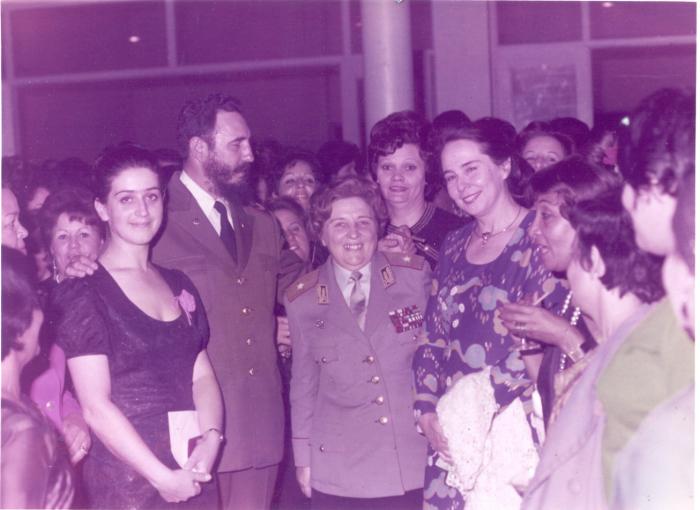
The women of Santiago and Granma are now united in the beautiful story woven by the Federation of Cuban Women (FMC), in the 60 years they celebrated this August 23
United by the Sierra Maestra mountain range and the waters of the Cauto River, in the struggles marked by Mariana Grajales, Canducha “la Abanderada”, and more recently by Celia Sánchez and Vilma Espín, the women of Santiago and Granma are now united in this beautiful story woven by the Federation of Cuban Women (FMC), in the 60 years they observed this August 23.
It was to Vilma Espín Guillois, a brave and sensitive woman from Santiago, that Commander-in-Chief Fidel Castro Ruz entrusted the creation and strengthening of the organization destined to work for full gender equality in the new society. This is why the FMC women of her territory made a firm commitment this time to dedicate the Vanguard flag and the national act for the date.
“For all the FMC women of the country it has been a year of intense work -considers Elena Castillo Rodríguez, secretary-general of the FMC in Santiago de Cuba-, first because we started it under the incentive of such an important anniversary, and then because the appearance of the pandemic changed the life of all Cubans and, of course, it imposed the reorientation of our work.
“Based on the Party’s motto in the territory: “With the effort of all, we will win!”, we did the same intensity of work from the Guantanamo border of Yerba de Guinea to the Granmense of Baire, and that allowed us to declare all the municipalities (9) as Vanguards, and to seal that result at the level of the country.
Based on the solid tradition that has kept it in the vanguard in recent years, Granma was very close, achieving vanguard status in ten of its 13 municipalities. It wa, a challenge that, according to the Secretary General, María Elena Hechavarría Carralero, was focused on strengthening its grassroots structures and community action.
“We are one of the links that the enemy imagines with weaknesses to try to distort the reality of the Island, but, considered by Fidel as well as by Raúl and Díaz-Canel, as bastions in each project undertaken, we have taken all the spaces to demonstrate that women are an essential force in the sovereignty of the Nation”.
THE VITAL HEARTBEAT OF SOCIETY
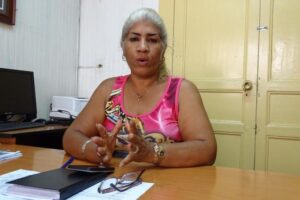
Elena Castillo Rodriguez, Secretary of the FMC in Santiago de Cuba Photo: Eduardo Palomares
For most of the 412,500 FMCers in Santiago and the 325,000 in Granma, one of the most important, humane and beautiful activities of recent times has been the challenge taken on from the COVID-19 pandemic, because not only was it to make thousands of nasobucos, but they also provided the fabric and thread, and then went to donate them in the neighborhoods, squares and workplaces.
In both territories, they also went voluntarily to the health control points, to the sanitation and hygienization of public areas, to the house-to-house investigation and, without thinking twice, not a few young people took the step to contribute in what was necessary in the red zone of hospitals and centers of isolation of suspects.
Perhaps there is something more emotional,” says Castillo Rodriguez, “than seeing a girl with a pharmacy card or a warehouse notebook buying medicine and food products for a vulnerable person, or for the members of the Federation who took care of the old man who lives alone and brought him the same food prepared for the family.
Our women have grown up during the confrontation with COVID-19,” says Hechavarría Carralero, “because they did not wait to be called, they began to spontaneously deploy initiatives and we generalized and brought them together so that their impact would be greater, and all this has had the moral recognition that contributes to new efforts.
Within this complex situation, both leaders agreed that the scourge of gender violence that has wounded the world so much, has not been an embarrassing problem for their respective territories, since the Women’s and Family Orientation Centers work preventively, and a differentiated work has been done in dysfunctional nuclei.
Through specialists, talks have taken place aimed at promoting family unity and curbing the tendency to burden women with domestic tasks. At the same time, through dozens of training programs, the FMC has held training courses in socially useful activities for women and men who are not working.
In this way, including in recent days, some of the so-called “choleras” received job offers in the state sector or on their own account, ranging from pharmacy and commerce clerks, technical services, gastronomy, barbers and other trades that reintegrate them with dignity.
IN FRONT OF THE FURROW
According to Castillo Rodríguez, “Hot spots” in her province are the fronts for food production that women share today. This is not because of the complexity of the work, but because of its importance. In addition to facing the pandemic, they moved to gardens and patios to plant short-cycle crops and medicinal plants, which are already bearing fruit.
A lot has been said about the initiative of the food production areas in Santiago,” he explains, “and those structures are already in all the municipalities, where, if in the agricultural ones there is parity between men and women, in the industrial ones the majority of the women are making bread, cookies, candies, preserves and dozens of assorted products.
Currently, the strategy concluded in the Second Front and that goes through the Third Front, is sealing each municipality with the patios incorporated into urban agriculture, and the creation of agreements for pigs, sheep and poultry, attended purely by women or jointly with the family, which provides them with meat, food, grains and vegetables.
The women of Granma also contribute to these forms of agri-food production, their presence in the mobilizations called for, and the empowerment achieved in the labor area, where they make up 67% of the technical force, and assume key management positions, from the base up to all levels.
VALIDITY OF VILMA
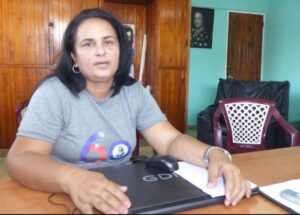
María Elena Hechavarría Carralero, secretary of the FMC in Granma. Photo: Mailenys Oliva Ferrales
Although the Commander-in-Chief considered the full incorporation of women as a Revolution within the Revolution, among the greatest teachings bequeathed by Vilma Espín is the defense of rights and the work she has conquered. This is why Santiagueras and Granmenses are now equally focused on confronting social indiscipline.
Her actions in the face of coleros, resellers and hoarders range from preventive work with people characterized by that anti-social behavior in the community, which has made it possible to detect soluble dysfunctional problems and the incorporation of 12 cases to work in Santiago de Cuba, to the support to order in the lines [in from of] commercial establishments.
Elena Castillo and María Elena Hechavaría emphasize the enthusiasm with which the FMCers have received the respective recognitions as vanguard and outstanding women. There is in a 60th anniversary celebrated in all the municipalities, in centers such as hospitals and of textile clothing, with high presence of women, and of course in the base.
In a special way, the Vilma Espín Memorial, located in the house where she lived and matured as a revolutionary, by turning it into a meeting point and even a staff for young clandestine fighters, once again hosted the Vilma en la memoria workshop, with the presentation of 28 research papers from the provinces of Granma and Santiago de Cuba, on the extraordinary woman.
Coinciding with the date and in view of the impossibility, due to the COVID-19, of the desired mass mobilization, a representation of the municipality of Segundo Frente paid homage to the eternal President of the FMC, Vilma Espín Guillois, in the name of Cuban woman, and before the rock monument that in the mausoleum to the heroes and martyrs of the II Eastern Front receives its ashes.
More Incentives Than Bans

More Incentives Than Bans
 By José Alejandro Rodríguez
By José Alejandro Rodríguez
pepe@juventudrebelde.cu
August 22, 2020
Translated and edited by Walter Lippmann for CubaNews.
Now that Cuba is on the offensive against economic crime, corruption and all sorts of indiscipline and violations, the most sensible thing is not to limit ourselves only to repudiating and neutralizing these demonstrations and the police operations. We must also diagnose with a perennial scalpel the socioeconomic causes that generate these evils and distortions, in order to prevent them and remove them at their roots.
Without ignoring the syndrome of asphyxiation caused by the imperturbable American blockade, the recent self-critical recognition by the country’s authorities of the slowness and lack of integrality in the process of updating the Cuban economic model in recent years is at least promising. And in the midst of so many difficulties and hardships, the new post-Covid-19 strategy raises expectations and encouragement to face the crisis. It also aims to translate into irreversible transformations what is pending in guiding documents such as the Economic and Social Guidelines and the Conceptualization of our Socialist Model.
In the opinion of many Cuban economists, who have been loyal to socialism since the brave critical and saving diagnosis, the recently announced strategy confers a much more audacious, systemic and integrating emphasis to transformations: it removes knots and obstacles to productive forces. It decentralizes and confers greater horizontality. It promotes food self-sustainability, greater export diversity and less dependence on imports. It makes the economy more democratic and invigorates entrepreneurship, because it seeks complementarity and similar possibilities among the different forms of ownership and management. It promotes incentives rather than prohibitions. It opens the doors of the watertight compartments.
Of course, these are the purposes. Changes will take time to reap their fruits, paradoxically in a fight against time. What is important about this strategy is not only its goals, but the way in which they are expressed, the intelligent ways to open those gates without being flooded and swallowed by the transformations. The other would be to fail through dogmatic starvation, to accept that economic problems continue to be faced with voluntary administrative measures and the attachment to the ucase, which is never political.
To the liberating and emancipatory character of the announced measures, the permanent scientific diagnosis of the transforming work should be added, so that from an observatory the errors and deviations in the shaping can be corrected. And at the same time promote the feedback of the states of opinion and popular consensus in terms of decision making.
For now, the daily episodes of police operations on economic crime reveal how far the Cuban economy has been submerged for years in the black market and illegalities, and in social coexistence with moral deterioration, to the nation’s detriment. And at the same time they alert us to how many distortions and design errors need to be corrected.
I will never justify crime and economic fraud no matter how difficult the circumstances. But it is also true that we lived for years among too many economic prohibitions that are now beginning to be rectified. And a proverbial ability to transgress the “legal” in order to survive was created, while it took a long time for these realistic processes of validation and sincerity to be carried out for many activities that were considered alien to the socialist ideal.
The result is what we are witnessing. Hence, post-Covid-19, with the ramifications of the world economic crisis and the perennial Yankee blockade, there will be no alternative but to assume all the risks of the transformations. On the one hand, rigor and discipline; on the other, incentive and entrepreneurship so that honest work, whether State-run or not, is the cornerstone that leads us to prosperity without abandoning social justice.
Speculators of Dishonesty


Speculators of Dishonesty
On the website of our newspaper, readers denounce, in addition to the resales, the effects suffered by the environment for their “campsites” in parks and sidewalks that count among papers and cans their shameless.
By Walkiria Juanes Sánchez
walkiriajuanessanchez@gmail.com
July 27, 2020
Translated and edited by Walter Lippmann for CubaNews.
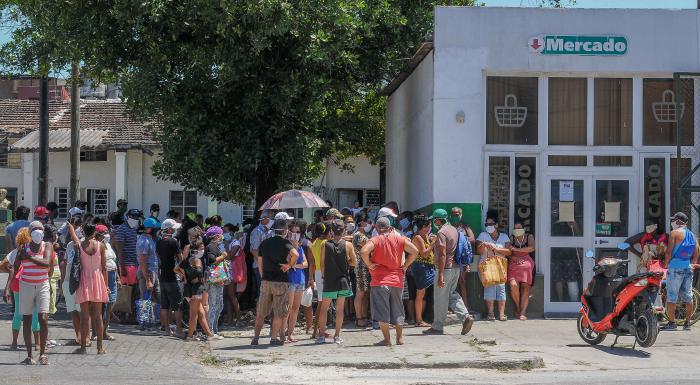
Queues and “coleros” abound in these months of COVID-19 in Cuba. Photo: Jose M. Correa
Queues and “coleros” abound in these months of COVID-19 in Cuba. They move in full view of everyone: those who mark two and three times, for several people, with the aim of selling their stuff to those who can pay high prices for rushing their time to buy. And there are also those who whisper in your ear that they have whatever you want (wet wipes, baby wipes, chicken, picadillo, oil, splits, refrigerators…), but only if you are willing to pay double, triple or who knows what number in CUC above their price in state stores. Then, to expand the resale, they even use the internet.
Like a ray of light in the midst of the global crisis, with its impacts on the internal market and the economic persecutions due to the blockade that increases the national crisis, a note from the Ministry of the Interior recently revived public debate on the subject, stating that more than 1,285 “coleros” had been sanctioned in Cuba since the beginning of the COVID-19 pandemic.
In view of this figure, which in the opinion of some will increase if the gravity of the situation is taken into account, the indolence of people without social commitment, dedicated to the transfer of products necessary for families, in the midst of a context of lack of supplies and national health emergency, comes to public attention.
One could come to doubt the humanity of these beings who, moved by individualism, forget that children, the elderly, pregnant women and the sick will not have the opportunity to obtain what they need.
On our newspaper’s website, readers denounce, in addition to the resalers, the effects suffered by the environment due to their “camping” in parks and sidewalks that count among papers and cans their shamelessness.
In the case of the severity of the sanctions that these individuals receive, diverse were the petitions to correct, energetically, these types of acts. Remember, the majority of those punished by the law only received fines of one hundred to 300 quotas, a minimum amount compared to the profits generated by the collapse of the sales system in the stores and the hoarding of products.
The so-called “lists”, supposedly created to organize the queues with tickets, numbers and shifts, also cover up the activity of the “coleros”, many of whom are the same organizers of the queues in the shops from the early hours of the morning.
If the authorities already have an identity card scanning system that allows for the order and control of this process, it should be used in the best possible way so as not to leave places available for other modalities.
Control within the stores should also be improved. An efficient service depends, in addition, on the organization and rapidity at the time of collecting the products, the personalized treatment to the client and the administrative vigilance towards the workers, demands that are frequently repeated.
Some people have proposed the use of the ration book [the libreta] as a mechanism to control the distribution of products in times of crisis like these. Something that has already been explained, since the country does not have the millions of dollars needed to carry out such a distribution.
Many other citizens request a greater supply in the stores, despite the effort that it means for the country to maintain them and in view of which alternatives for their re-supply have been generated.
The issue is not new. Among the greatest discontent is that the coleros still exist and cloud a trade already hit by the crisis and the economic, commercial and financial blockade of the United States. The cooperation of all could be the key to success in putting an end to the speculators, but greater control and a more effective complaint mechanism are needed, The will of the people is evident.
The Audacity of Squeezing the Needy

The Audacity of Squeezing the Needy
By Nelson García Santos
digital@juventudrebelde.cu
July 27, 2020
Translated and edited by Walter Lippmann for CubaNews.
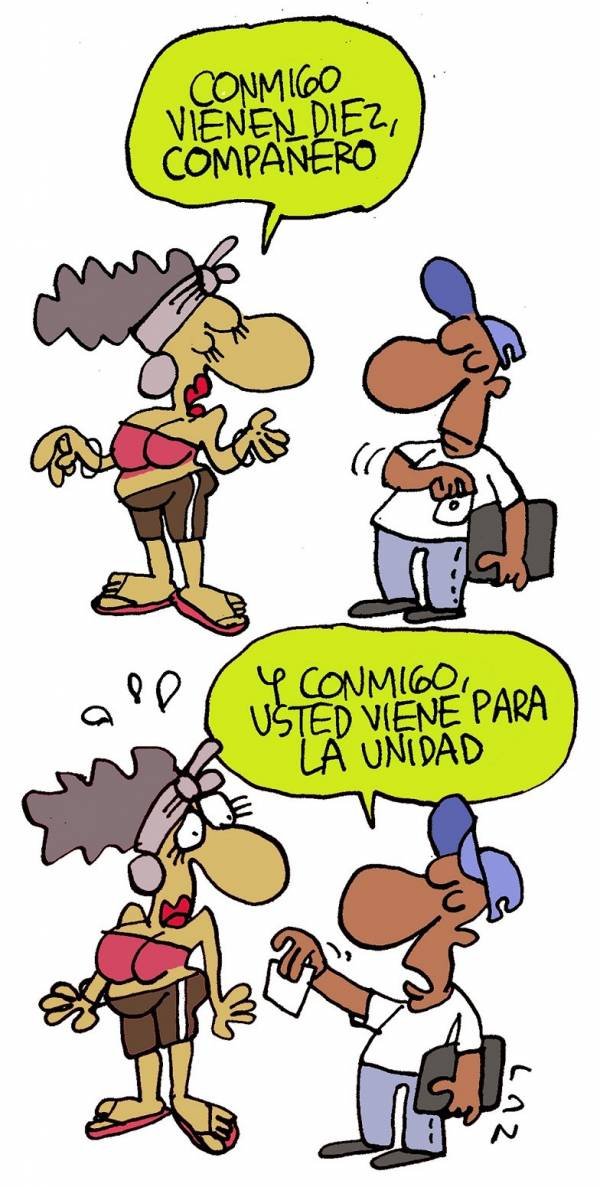
Money that is easy to obtain, like a raging river, incites the crime-prone to fish. Author: Juventud Rebelde Published: 27/07/2020 | 10:17 pm
Colera: Come with me it will cost you 10. Police officer: Come with me to the police station.
Money that is easy to obtain, like a raging river, incites the crime-prone to fish. And this true truiosm is, let us say it bluntly, even by the benevolence with which this phenomenon has been treated, more visible in the unbridled action of coleros and resellers.
This scourge, which is now in the public eye, is multiplying the weights, squeezing the needs of our neighbors to the utmost, who sometimes, with no other alternative, have to die in their unhealthy hands.
They go to the extreme of wanting to justify their illicit business with the impudence that they are solving a problem for the people when, in reality, this practice harms the official market, the population and shows an unacceptable disrespect for the Law.
To finish off this trilogy, as if it were derisory, it is complemented by hoarders who operate in the wholesale market offering wholesale merchandise.
They often do it with the desired results on the employees of establishments and, who knows, with whom else, to explicitly obtain goods without the bosses noticing.
But they also capture people, weight for weight, to turn them into coleros and resellers, preferably women, elderly people and even the disabled.
Let’s recapitulate: this scaffolding has its categories. The highest-ranking is the great hoarder, but there are the coleros, who operate on their own, and the pot workers, those who put up the money for them to hoard and then give them a profit for resale.
In recent times, the authorities have intensified the confrontation against these people who have made living a la izquierda [literally, “on the left”, but meaning outside the law, wl] their lucrative essence, while the wise tribune on the street expresses satisfaction, because they approve, as in any place, of that protection that should be imposed by the authorities in the face of those who break the law.
But so untouchable do many of the transgressors believe themselves to be that their obfuscation prevents them from feeling that the noose is being pulled to stop this disorder attributed to scarcity, a half-truth, because nothing can justify immorality.
Here is an example of what is being done: for crimes related to illicit economic activity, disobedience, hoarding and the spread of epidemics, around 1,285 coleros have been prosecuted in Cuba since the beginning of the COVID-19 pandemic last March, according to a report published on the website of the Ministry of the Interior.
That figure has been broken down and prophylactic measures and fines have been applied. Others have been charged with the crimes of illegal economic activity, disobedience, hoarding and the spread of epidemics.
With the thunder falling on some and blinding others with the glare of lightning, the only thing advisable is to avoid turning a deaf ear to the very clear message from the authorities that illegalities will not be allowed, because they can simply compromise the daily course of our society.
Let no one think that this is just a momentary action and everything will return to normal, that is, let it be done and undone.
The people even want the laws to be tougher against all these illicit actions, so that anyone who has the idea of throwing himself into the dark labyrinth of living outside the law will think twice. It’s that logical, that simple.
Subscribe to Blog via Email
| M | T | W | T | F | S | S |
|---|---|---|---|---|---|---|
| 1 | ||||||
| 2 | 3 | 4 | 5 | 6 | 7 | 8 |
| 9 | 10 | 11 | 12 | 13 | 14 | 15 |
| 16 | 17 | 18 | 19 | 20 | 21 | 22 |
| 23 | 24 | 25 | 26 | 27 | 28 | 29 |
| 30 | 31 | |||||


You must be logged in to post a comment.